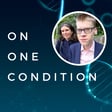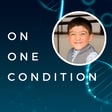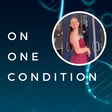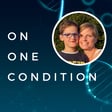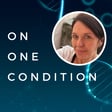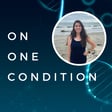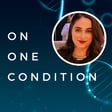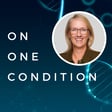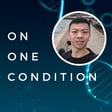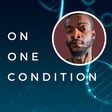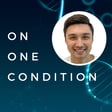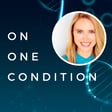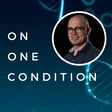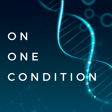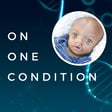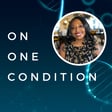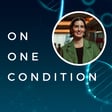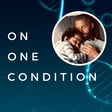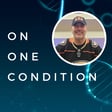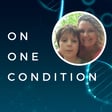Become a Creator today!Start creating today - Share your story with the world!
Start for free
00:00:00
00:00:01

Episode 40: Barak Kassar - ICE Syndrome
Barak has an extremely rare eye condition called ICE (Iridocorneal Endothelial) Syndrome. Because of this condition, he also developed glaucoma in one eye. In this episode, we talk about Corneal transplants, glaucoma and how to care for your eyes, but also about the advancement of technology and AI as a tool for people with partial vision impairment.
Barak selected a full album, Cowboy Carter by Beyonce.
Transcript
Introduction and Personal Connection
00:00:00
Speaker
Hi, I'm Sylvain Beartolo, and you're listening to On One Condition, a podcast to raise awareness about health conditions by listening to people who leave them every day. Today, my guest is Barak Kassar, and we're going to talk about ice syndrome. Hi, Barak. Nice to meet you. Hello. How are you doing? I'm good, Sylvain. Nice to meet you. It's great to... I love your podcast. I love the name of it. i love uh, hearing people's stories. Uh, and so it's quite an honor to be on your podcast. So thank you. Well, it sounds like you're my biggest fan. So it's quite an honor for me as well. Uh, so we're going to talk about IC Jerome, but I love starting with a song. So, uh, I'm going to ask you about your song, but I know you've chosen something slightly different. Yeah. I've just been listening a lot lately to cowboy Carter.
00:00:56
Speaker
from Beyonce. And there are just several songs on there that I love. like Her voice is just so incredible. And I love Blackbird. It's a fun song. It's beautiful. I love ah Texas Hold'em. They're really fun songs on there. But also, there are just a couple of songs. like There's this one called Protector that just makes me so think about my wife and our kids, how she's just such a fierce protector. of them. And even though they're older now, they still need, we all need protection throughout our lives. and ah And they of course have other people protecting them too, but she's such a strong protector. And then there's another one. I don't remember the name of it, but it kind of makes me think of how I think about her. It's like, I'll be your shot i be you shotgun rider till the day I die. And I just, anyway, there's just a lot on that album that I just, I love. So I've been listening to it a lot lately. and
00:01:50
Speaker
Yeah. And now you're making me think that I should expand the question to albums actually, because songs are good, but albums usually you you've got more about different topics on albums, which yeah, I'll have a think about that one. Okay. All right.
Discovery and Mismanagement of ICE Syndrome
00:02:10
Speaker
So starting to talk about eye syndrome, ah how did you realize that um you were affected by this condition which affects the eye, if I'm not wrong? Correct. It it it affects the eye. It's very rare. It stands for iridio-corneal endothelial syndrome. And
00:02:32
Speaker
I actually, when I look up epidemiology of it, there aren't really numbers. ah it's it's um And my my doctor believes he sees more than any other doctor in the United States with eye syndrome, and he's just got a handful. So that's that's how rare it is. I mean, what it causes is not rare, and glaucoma, for example, impacts I don't know, something like 80 million people globally. And that's expected to hop up to like 115 by 2040 as the population ages further. So um it's it's a cause of some important, you know um not to say eye syndrome is not important, but just there aren't just that many people with it. So i my dad, my late dad, he died a few years ago, was actually an ophthalmologist.
00:03:19
Speaker
And whenever I would go visit him ah in his town in San Diego, he would always want to just take me to peek at my eyes. And ah and and at the time, I was in my mid 20s or so. he would He would refract me, you know like, just check me for, do I need glasses? And I just didn't ever need glasses. So the whole thing always seemed kind of funny to me, like, why? I think it was just his way of wanting to get to spend a little time with me. um And in retrospect, they were nice moments. But one day, he kind of freaked out. And ah he'd noticed that my pupil in my left eye um
00:03:55
Speaker
OS is what eye doctors called. OS is the left eye. OD is the right eye. OS is s is sinister in Latin, which is a little odd. ah My left eye, the pupil was not round. It was very ovoid. ah and ah And it freaked him out because it could be an indication of a brain tumor, actually. and But he did research, he talked to a bunch of people, and it turns out that it's this thing called ICE syndrome. And he'd I think he he'd heard of it, obviously, as it as a as a physician, as an ophthalmologist. um But he didn't really know anything about it, and he um he found a doctor up in San Francisco where I live, and I went there at first. And then I then i entered this kind of interesting period where I regret that I did not manage my condition well.
00:04:52
Speaker
ah I think I lost a lot of vision that I can't get back pending some, you know, amazing new technology that comes along. I i lost a lot of vision in my left eye because I didn't really manage it well as a mid-20s person. So, yeah, that's how I found out. And if i and I actually, you know, ive i I've been doing a lot of cleaning out of the house and I and i found these old medical records and they have actually slides. I don't even know if people make slides anymore actually. yeah And they're dated like 2000. They actually started in 1999. And they go up, they they stop in 2001. And one and um then I i think the slide there's their their images long past that. But you can really see like that does not look like
00:05:46
Speaker
Like at one point my eye is, my pupil is very oval and at another point they're like three pupils all in different parts of the eye and kind of, that's how I found out.
Family Dynamics and Medical Insight
00:05:59
Speaker
ah It sounds quite fortunate in a way that your dad was an ophthalmologist and was checking your eyes regularly. Is it something that would have been caught this early, if not? I don't think so. No.
00:06:14
Speaker
My family likes to joke that I have little tiny, like little beady eyes that I do. like so you don't It's not like my, I don't have like Disney character eyes where they're super wide open. and yeah I guess only Disney cartoon characters. yeah Actually, weirdly, if I look at a lot of actors, they do their eyes tend to be quite open, I've noticed. Take a peek, see see if I'm bright or not. but ah So it's, you know, I don't really, you don't really look like when you look at my eyes, I mean, when you look at my face, you mostly see other things like I think my smile, my smile is quite prominent and stuff. So like, you don't really look inside my eyes. And, um and so yeah, it'd be really like, I think just in the regular course of life, you wouldn't, I wouldn't notice this, or others wouldn't notice it either. And then um there are like, it doesn't hurt. um It doesn't like there, no, there aren't really signs. So I think you're absolutely right.
00:07:10
Speaker
The problem is that, and this is strange, and I feel strange saying this, but my father was like, my father and I had a not the greatest relationship when I was in my mid-20s. And ah he had advice for me on every every aspect of my life, every aspect of my life. And so, and I just started to just like, I just kind of ignored him because I just felt like often he was wrong and he wasn't really piggy. It wasn't really about me. It was about just his thoughts for me. So of course this one thing where he's an actual expert, like I just ignored him. Like, because like I thought he was, you know, it was just like career advice or graduate school advice.
Glaucoma and Treatment Reflections
00:07:45
Speaker
They're like, meanwhile had I, and, and, and, um, and one of the things that was really important, and this will get into the glaucoma part of the conversation is if you don't, so the ice syndrome causes glaucoma.
00:07:59
Speaker
And we can get into that. Well, if if it matters, we can get into why glaucoma is increased pressure in your eye. And if, and if left untreated, that pressure literally like crushes the optic nerve and kills the cells in the optic nerve. And you can't get that back. but so Those cells are dead. And so that in in glaucoma, you start to lose vision from the out, like from the periphery or from the outside in. And you know also people don't really notice that at first, but I like went through a period of time where I really did not manage my pressure. like um and ah even and And my doctor in San Francisco, but my initial doctor was actually, to be honest, a little chill about it. And so I was like, oh, my this doctor's not being that intense about it. My dad is being really intense about it. My dad tends to be super intense about everything. So I just kind of blew it off. and okay But had i take had I taken it
00:08:51
Speaker
Seriously and actually listened to him because in the end he is you know, he was right about a number of things um Including that then I think I would ah then I think your comment that it was fortunate would have been Totally true because yes, I would have caught it early and yes, I would have managed it earlier better and then I would not Probably it's unclear. I might have lost this vision anyway um But okay, but anyway, so yeah, so it's kind of it was fortunate, but I was young and proud and dumb and
00:09:22
Speaker
Well, I didn't say it.
00:09:26
Speaker
ah So you said that you could have managed it. You said that you could manage or control the the pressure in your eye. how So what what would you have done differently then? Well, everything that I do now, now I'm very good about it. It's just that it's, and and I'll explain why, but so there there's really nothing you can do as of as ah as of now about ice syndrome itself. ah it Basically what it is is these little these cells that are, they grow where they're not supposed to grow and they do a few things. For me, they've done two things. They've attacked my cornea and they've attacked my cornea a bunch of times. I'm embarrassed to say, but I cannot remember if I've had four or five corneal transplants in my life.
00:10:18
Speaker
They also cause glaucoma because they take grow and clog the drainage ducts in your eye and your eye basically is like ah I mean, the way what my the way my current eye doctor, glaucoma doctor, um talks about it is your eye is kind of like a sink with the with the taps running and the drain. And that's great. Like if the drain is open and the taps are running, it's good. that The flow remains perfect. Like it doesn't fill up. When the ducts or the drains are closed or partially closed, like in my eye and like with a glaucoma patient, that's really what happens.
00:10:57
Speaker
The fluid has nowhere to go. like and and It's not like a sink and it's it not like the sink where it overflows and floods the bathroom. it just Your eye pressure just increases and increases and that crushes the the optic nerve. There's a lot you could do about that. i mean there's like so and there ah initially yeah There are drugs you can take. There are drugs to decrease flow, increase drainage. There are also surgeries you can have. so i have a um a little, i think it's I think it's called the Ahmed Stent, that's what that's the brand, I have a little thing in my eye that is a drain. um But before that, like when they first started glaucoma surgery for me, they did it the least invasive possible. So like they did this little, I think it's like a little cut, then kind of like created a little drain, then eventually they put a little plastic, this stent in. um And so it's a cut there are a lot you can do. And if I had I done that more, I think just taking the drops, now I take drops,
00:11:54
Speaker
um pressure drops once a day, every day. um Had I just done it back then, it it might have ah prevented the pressure from climbing. and you know Now my pressure's in in a good range, but there was a period of time when it was high, and during that time of high pressure, it it impacted the nerves.
00:12:16
Speaker
It's incredible. I know very little about what you can do to an eye to make it better. But it sounds like there's a lot actually, which which is great.
Impact on Daily Life and Career Balance
00:12:27
Speaker
Well, there is a lot of though. It's funny because people think of the eye as a the eye. And this is partly from being the child of a of an ophthalmologist, but mostly from being an ophthalmology patient now. And there have been i haveve two specialists, a cornea specialist and a glaucoma specialist. There was a period of time when I also had a retinal specialist. The eye is like this universe. like there it's he there are like they're different It seems like such a small thing. but you know And then there are neuro-optimologists that I learned about just from my professional work, too. like So there's it's such a universe. So there's a lot you can do for a lot of different things in the eye. um And there's ah for some things, you can't can't do anything.
00:13:13
Speaker
Yeah. Yeah. Yeah. Well, I think about the eye as this thing that if you touch it, then it's damaged and and and that's it. But now you've talked about like getting a cut to release pressure, getting a stent, corneal transplant. So it's something that we can actually repair and that we can play with if you don't mind the term. Yeah, it's very it's fascinating. Yeah, it's very like it's actually a resilient ah oron and i so and and And also, one thing I've learned is the way your eye lids, you know, like your eye is kind of recessed. There's a lot of rap about your face that actually protects your eye from like getting poked and and ah so pretty pretty good design. Yeah, yeah.
00:14:03
Speaker
So do you have glaucoma on top of ice syndrome or is is the glaucoma something you manage and does it not impact you that much? Well, the glaucoma is, it I mean, on top of, i yes, in the sense that the ice syndrome caused the glaucoma. Had I managed it well as a young person, i I don't know because it there's no way to really know. It might still be as as bad as it is. It's not, my glaucoma right now isn't bad. It's totally manageable. I mean, I take this drop, I go get checked every, actually now I go to the glaucoma person every six months, the corneal person every six months. So like I'm going to a doctor every three months, roughly. um It's totally manageable. And I think where I starting today,
00:15:01
Speaker
It's possible that I might be doing better. but um um but And then I think that's true for a lot of glaucoma people. it's actually quite but If you catch it early enough, it's quite manageable. okay um But it's hard to know. My eye is is a little bit of a crime scene. i mean like it it's like it's Every time they have to do something, it's harder and harder to work in there because there's scar tissue. there's it's just ah like i you know I've started to have conversations that at one point, it might just be worth just stopping to work on it. Because like it's some there's there's like, it just kind of, I go in phases. Like right now, it's a very calm, mellow phase. I'm not i'm going to the doctor, you know like I said, once every three months. um Take my drops once a day, I'm fine. But it at any point, like i it like something like this has happened a bunch of times. like Something could happen that I don't know.
00:15:58
Speaker
And, uh, and then it's like, okay, another corneal transplant or cataract surgeries. I something else I've had or like, like it's just something. And it just, at some point and and the vision I have in that eye is so small. It's like, okay so at some point it becomes like, what's the point? But right now the point is I feel like it's like one of those tiny, tiny, tiny spare tires in your boot or your trunk. And, um, and if. something were to happen to my other eye, like car crash or, yeah you know, I'd nail, I'm putting a painting in the wall or cutting wood or whatever. Like that happens. That can happen. Then my tiny, tiny vision will feel like a lot if I lose the other eye. i me Yeah. Yeah. I get that. yeah Does it limit you at all in what you can do, for example, driving or anything else? It's
00:16:55
Speaker
Yes and no. I mean, i'm ah I'm allowed to drive. I drive fine, but I am required in the state of California to take an actual driving test, a special driving test every two years. So that actually comes up pretty fast. Yes, yeah but and so but i've you I've learned which Department of Motor Vehicles to go to. I found a nice mellow one, and it's going a nice day, and it's not the worst thing in the world. um It's I don't have for dry. I don't, you know, yeah we have two eyes for depth perception. So I have fine depth perception for driving for that kind of like more gross like distance. But if I, for example, when it's like we were having supper and I was pouring you a glass of wine, I would, I find that I really need to like hold the glass, hold the bottle and kind of feel the edge of the bottle. Cause if, if not, I've,
00:17:52
Speaker
definitely spilled wine before, just because I i miss the distance. you know i I think the glass is closer or farther. So it's limiting in that way. it is you know i mean it's i have to like If I am driving or if I'm walking, i have to really turn like I have to really turn my head to the left because I don't have peripheral vision in my left eye. And my left eye also it's just doesn't really work hardly. so yeah I really have to like almost get my right eye involved. I'm basically am'm getting my right eye involved. And very occasionally, like like maybe a month ago, I felt sick to my stomach. I was in this very cute little ah grocery shop by our house in San Francisco. And I was like, you know it's a very small place with narrow things. And I was getting some cucumber or something. And I just turned around. And I just i didn't see this woman right there. And I basically like, I bonked her in her
00:18:50
Speaker
I don't know her upper, like somewhere between her chest and her neck. And I just felt at least it wasn't her face, but it hurt her. And she's like, what, what? And I just felt so bad. Usually I'm really careful about like what's going on around me, but sometimes I forget, you know, I was like focused on the cucumbers. Yeah, but it's good to hear that it's not limiting you. I would have expected that you you may have issues with with yeah with driving or or even finding your way if you don't have much vision from
00:19:25
Speaker
t twelvelf yeah but i guess has it do Do you think as well your your right eye has adapted and and maybe your vision is a bit wider in your right eye? i i have yeah That's a good question. I have no idea if it's better than it would be, but i i my right eye is as good as a 50-something-year-old eye can be. i mean i have There's the early, early sign of a cataract forming, nothing to worry about. That's very normal. You know, I need reading glasses and I start actually have progressives now because like that's just normal stuff. um So I just have, I mean, I am feel so, so lucky that I have this other eye. um i So I really, you know, feel
00:20:08
Speaker
People always ask me, how's your eye? And it like it you know it did' it's a pain. But but really, I have a good eye. And it you know you need one. Now, of course, I worry that something could happen to the other eye. And you know you know and and and it's as my doctor says, my risk of something happening to my other eye is elevated because my spatial awareness is not even halved. and my kids know if they really want to mess with me like come from the left yeah and and you know like it's just so but yeah I feel and you know most of my work I mean I run this design creative agency like you know like it's so super super visual even though we do a lot of writing in our work when we make
00:20:51
Speaker
you know Whatever, websites, videos, whatever. But the words and the images are so linked together. And I'm totally i'm totally able like totally able to do my work. um And i feel just I feel super, super lucky. And and and there main they're actually, the real reason you asked what why I kind of was curious about being on your show. and i I feel like people have it way, way worse than me you know with all kinds of diseases.
Prevention and Future Possibilities
00:21:19
Speaker
The main reason I wanted to do it was just because to talk about club glaucoma is something that happens to it millions and millions of people. And it is really a good idea, especially as you get older, to just go get checked because the early signs are
00:21:35
Speaker
not obvious. It's not like you feel pressure in your eyes. It's not like your eyes, your vision is dropping. And it's just a really good idea. And um and it's not that well understood. It's well understood. it's not There isn't that much a super high awareness for it. And I think people will really associate their eye doctor with like, just going to the optometrist to like, go get your eyes checked or go to go into Warby Parker or whatever, you know, go online and there, it's worth it to go, you know, I don't, I don't know the exact best age to go, but definitely worth it to go and and then not be like 25 year old me, but like actually, you know, be serious about.
00:22:17
Speaker
Yeah, it's interesting actually because you you get checked nowadays for a lot of different things once you get to 45 or 50, like you receive those letters from your doctor and they're a nice reminder that you're getting wiser in a way. But I don't know if you, if it's a compulsory check for glaucoma, although like you said, I think you said 80 million people. 80, eight zero. Eight zero. yeah yeah Yeah. So yeah, it would make sense to have a regular check.
00:22:57
Speaker
How often would you recommend this? I honestly don't know. there' there's like ah I mean, I can look it up, but there are tons of glaucoma websites and and it'll say what's a good age to start and how often to go. And the thing I think the thing that is really crucial is that if you get like i the reason I have glaucoma is because of ice syndrome. And ice syndrome is what they call unilateral. It's just on one side. But glaucoma, if you get glaucoma, like I have what's called secondary glaucoma, meaning it's caused by this underlying thing, right this primary thing. If you have primary glaucoma, it's both eyes often, or always, actually, I think. and so If you think about it, like if you start to lose vision, peripheral vision in both eyes, that's not good. it's like and it's so its Then you don't have this like one good eye that is dealing for you. like That's carrying the day. so
00:23:53
Speaker
like For example, just glu glaucoma.org. It looks like a perfect a good great website. um Types, treatments and resources, understanding, et etc., etc., etc. That's the Glaucoma Research Foundation and I would recommend going to check that out. There's a lot of good info there. Yeah, that's a great message for our audience because there are nowadays there are so many things you can do as a preventative action and that's one of them. But I don't think there's enough done by healthcare systems to actually push people to take those actions.
00:24:37
Speaker
Which makes no sense because, of course, prevention would save the health system so much money over the course of a person's life. and it' So in the end, of prevention is so much less expensive. but Yeah, they think they put a lot, it's a lot of performative words about prevention, you know, like sending out little newsletters and stuff, but from the health from the healthcare, care from from insurance companies. But anyway, that's ah ah the odd one condition, the condition that that we suffer, at least in the United States, from the greatest the greatest condition is the healthcare system. like
00:25:15
Speaker
Yes, yeah well, it's not just in the US. I'm not necessarily happy with the little prevention that's done in the UK. Oh, at the NHS, yeah. Yeah, I am. So what's your prognosis then with your left eye? I mean, it's the i mean in in my work, I see all sorts of, you know, regenerative work being done in other areas, stem cell research and applications. So it is possible that something is going to come, you know, some, I mean, I don't want to say magic. It's not magic. It's really hard work that biotechnologists do, but some magical
00:26:05
Speaker
uh, thing is going to happen, but it just feels like most likely for me, um, it'll either, I'll either keep it kind of at this state or eventually I will just say enough and I will, um, let it go. And then, and I don't honestly really, like I've, I've tried to have conversation have conversations with my doctors about what letting it go means, you know, a glass eye, for example. I think for me, in order to make that decision, I really need to understand, and I've not got a great answer yet, is what's the management of that? you know like me like i Is it really you just have this thing and it's there and then you don't have to worry about it? Because um that mean for me, the biggest impact on my life is just the managing of it. Even when it's calm like this, it's still a doctor's appointment every um yeah every three months. It's still you know getting prescriptions renewed. it's still
00:27:02
Speaker
an biannual ah driving test. like It's a low grade hassle. like Is that going to go away? um ironically the only i could get I would have fewer driving tests with a glass eye because that's not considered a progressive disease, according to the bureaucracy of the California Department of Motor Vehicles. glauoa Because it says glaucoma, it's a progressive disease, even though it's not getting any worse. It can't get worse, really. Effectively, it cannot get worse. but yeah they but that's so it's but and But then there are also times when it's not calm and management is like, I have to go to the doctor.
00:27:41
Speaker
I mean, there have been periods where I go every day. I mean, some of these surgeries, when I first had this, I had some of these surgeries where I had to like literally lie still in bed and attempt to not to blink for like, can you imagine, for like four weeks. This is in my thirty early 30s. This is like a really bad period in and our family's life because my wife had a really bad um pregnant like pregnancy issue and I had this. And it was just like, there were there there was a period in our life when this was like a huge, huge, huge, huge thing, like the the management of it, right? Not the vision, but the management of it. Like it's way, way calmer now, but it could peak again. And so it's just, that's that's the that's the impact. I'm not really, that so I don't, I can't really tell you the prognosis really. It's- No. Okay.
00:28:31
Speaker
Going back to what you said about the driving test that you have to take every two years, you have more vision now than if you had a glass eye. Yet you still have to take that driving test, which you wouldn't have to if you had a glass eye. Correct. Did I get that right?
Technology and Vision Enhancement
00:28:49
Speaker
You absolutely got it right. and i mean It makes sense doesn't make that sense. yeah i mean I could understand like if I can get into the bureaucrats' mind, I can understand it. It's glaucoma in their in their mind. right it's ah it's ah It's a shifting thing and it can get worse. It can get better right so because a lot of people are start like are starting at a much better place than I am now. so They want to know
00:29:15
Speaker
did it get worse in the last two years so much so that your driving is impacted? It's just so that for me, it's like it's so already in a bad place. like it'ss that But I mean, I have to say, like one thing that's been, I don't know if this is like really appropriate for your podcast, but I've been i've been so fascinated. like I rented, I went to my uncle's 80th birthday party a month or two ago and I i rented like a in Ohio and I rented a regular like VW or whatever. And then I got a note from the car company saying, the rental company saying for $2 extra, you can get a Tesla. I was like, this is, I'm just kind of curious what it's like to have a Tesla for three days. So I rented one instead and the vision systems in that car
00:30:06
Speaker
were so cool. like First of all, just looking at the screen, how much it sees yeah compared to me. right and Then like and then that when you turn on the the turning signal, it literally a camera turns on on the side of the car. and the like it for someone who has very low peripheral load and no peripheral vision on my left side this was like an incredible example of technology helping now it's mostly this was designed to just help. Regular people but for me and then.
00:30:40
Speaker
I yeah like maybe three weeks ago, I got off the the waiting list for Google's self-driving cars in San Francisco. They're camo cars and you could sit in the front in those cars and you can see their visual like And again, like compared to me, that car is seeing so is processing and experiencing and is aware of so much more, like five people crossing the road. yeah you know and i just and And that's like right in front of it. Meanwhile, it's also noticing the bicyclist here and the bicyclist there and this car. And I just thought, it it just made me think a lot about, yeah, there may not be
00:31:26
Speaker
um I said earlier, like some magic that might happen in biotechnology, but just in regular technology, these kind of external to your body, like, I mean, I could potentially what I want, I could imagine some sort of app on the phone or glasses that potentially do that, right? That like, oh, yeah, that's very true. Yeah. And I was just also thinking, like, you know, in a humans, we call it peripheral vision, right? and ah and And for animals too, but like in the in one of those self-driving cars, it's it's not so much that peripheral is different than central or like it's just all 360. Yeah, yeah, yeah. All at once. And it's amazing actually. And so maybe there will be a way for that stuff to come out of the car and into just regular life. And and so there is a lot there potentially. And and and thinking about how that might work for people that are
00:32:21
Speaker
just actually don't see with either eye you know or have compromised vision in either eyes. And I also just recently saw like an AI app that you just hold the phone up and it was literally to talk, it was a chat, it was an open AI, like their newest their newest chat, I think it's 4.0 and it was just describing to the person holding their phone, there are these ducks swimming in the river and they and and it was done in a really nice human way. It wasn't like, there are ducks in the river. It was just very sweet. So, I think there's a lot and and maybe we won't even need eyes one day. Yeah, that's very interesting and I love that you brought that up because it's true that we look at medicine and like I mean clinical trials, I look at clinical trials to help with any type of condition.
00:33:13
Speaker
But there will be a day where the that line between high tech, new tech, and how it can help with people who have health conditions will be blurred because you're right that like we've got glasses now that can give you information about your environment. You're completely right about Tesla. I was in one once and it's incredible. It sees exactly the shape of a bus, how it's orientated. It's much more accurate than us, definitely.
00:33:54
Speaker
So, yeah, no, you're raising a very, very good point. Very interesting. And I'm sure we'll see some advancement very soon, actually, in in how technology helps, ah I wanted to say, enhance the the human senses in a way. Yeah. Yeah.
Finding Contentment and Balance
00:34:17
Speaker
Well, amazing discussion. I love it. Thank you. earth That brings me to my last question, which I love asking everyone, which you've probably heard, actually, if you've listened to the podcast. As your fans as a Sylvan fanboy, yeah, sure. What's your happy place, a place where you feel like this?
00:34:40
Speaker
You know, I was thinking about it and it's actually not a place place. It's a state of mind. Like when I'm feeling content and when the people around me that I love are feeling content, not necessarily like gleefully happy, but just yeah okay, then I can literally be anywhere. I mean, and and it is sometimes that a physical place will help me, but I literally could be anywhere and just knowing that and, uh, And so that's for me, and in it you know and i you know sometimes it's hard when not, you know i love ah i I love people and i you know and and ah um and so sometimes they're not doing so great. And so i've sometimes I have to learn to like still be okay when they're not, but um it's when everyone is like, when my wife is doing all right, my kids are doing all right. And and as you expand the circle, i I'm just, that's my happy place.
00:35:35
Speaker
Nice. I love that. So it's a happy state of mind. Exactly. That's very, very nice. It's quite portable. It's good. It is. It is. Well, lovely talking to you, Barak. Thank you so much for taking the time to share. And I've learned a lot about the eye today. So thank you for that as well. Thank you. Take care. I will talk to you soon. Ciao.
